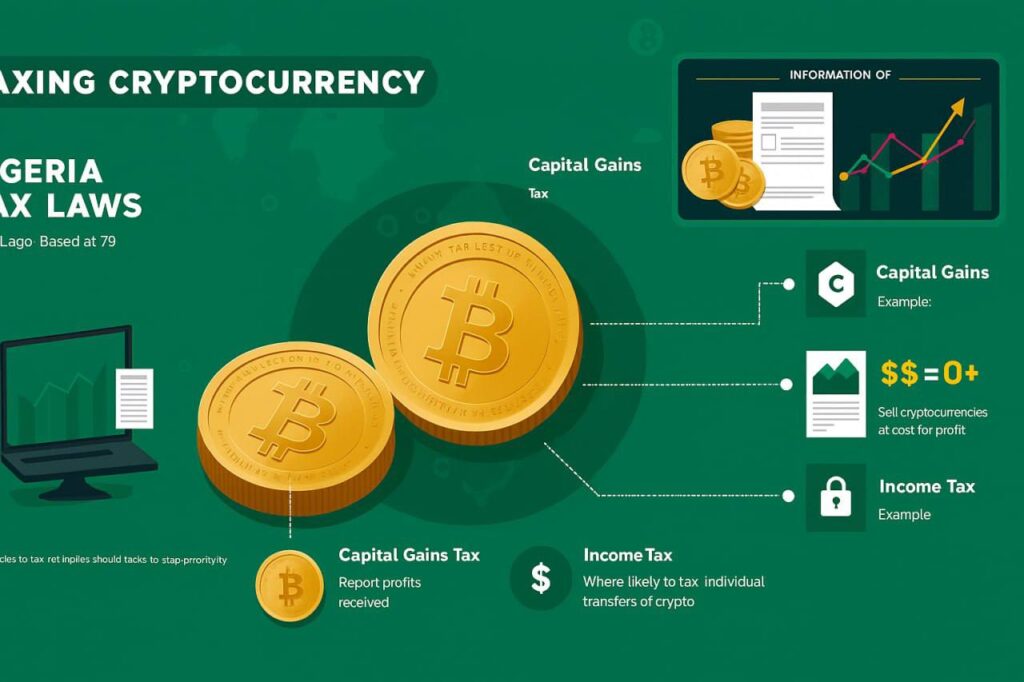Crypto in Nigeria has always operated in a legal grey area. But in 2025, the question is louder than ever:
Is cryptocurrency now taxed in Nigeria? And if yes — how does it work?
With more Nigerians investing in digital assets, receiving airdrops, and trading daily, the Federal Inland Revenue Service (FIRS) and Security and Exchange Commission (SEC) have both made their stance clear — crypto is not above tax laws.
Whether you’re a casual trader, Web3 builder, or just stacking airdrops, here’s exactly what you need to know.
Is Crypto Taxed in Nigeria in 2025?
Yes — crypto is taxed in Nigeria.
The Finance Act 2023 introduced a 10% Capital Gains Tax (CGT) on the disposal of digital assets, including cryptocurrency. This tax officially took effect in May 2023 and continues to apply in 2025.
So, what does that mean?
If you sell, swap, or cash out your crypto and make a profit, you’re expected to pay tax on those gains.
What Counts as a Taxable Crypto Event in Nigeria?
Not every crypto activity is taxed — but these are the ones that trigger tax obligations:
Taxable:
- Selling crypto for fiat (e.g., USDT to Naira)
- Swapping one crypto for another (e.g., ETH to SOL)
- Cashing out trading profits
- Getting paid in crypto (e.g., freelance work)
- Selling NFTs for profit
- Gaining from DeFi protocols (e.g., staking, lending yields)
Not Taxed Yet (But Tricky):
- Holding crypto (no selling)
- Receiving free airdrops (unless cashed out)
- Wallet-to-wallet transfers (no profit made)
Important: Even if your funds stay in crypto, once you make a gain and realize it (e.g., swap or sell), the government expects you to report and pay.

How Much Is Crypto Tax in Nigeria in 2025?
Here’s a breakdown:
| Tax Type | Rate | Applies When |
|---|---|---|
| Capital Gains Tax (CGT) | 10% | Profit from selling or swapping crypto |
| Income Tax | Up to 24% (tiered) | If you earn crypto as a salary or payment |
| VAT | Not yet enforced | Still unclear for crypto-based services |
So if you buy ₦200,000 worth of Bitcoin and later sell it for ₦300,000, the ₦100,000 gain is taxed at 10%, which means you owe ₦10,000 in tax.
Are Nigerians Really Paying Crypto Tax?
Right now, compliance is still low — but regulation is catching up fast.
- FIRS has announced plans to track wallet activities and enforce crypto reporting
- Exchanges working in Nigeria are being asked to submit user KYC and transaction history
- Startups that deal in crypto — including some fintechs — are beginning to register for tax compliance
In short: the system is being built. And whether you’re a casual user or a full-time Web3 founder, it’s smart to stay ahead.
How to Report and Pay Crypto Tax in Nigeria
You can report your crypto-related income or gains through:
- The FIRS TaxPro Max Portal
- Your personal income tax filing (if self-employed)
- Company filings (if you’re a startup founder or builder)
Make sure you keep proper records of your trades — dates, amounts, wallets, and gains. This helps calculate what’s taxable and what’s not.
What About Crypto Airdrops? Are They Taxed?
Airdrops are not taxed at the point of receipt — but once you sell or swap them, any profit made becomes a taxable capital gain.
So if you receive 100 tokens for free and later sell them for ₦50,000, you’re taxed on that ₦50,000.
How Is the Government Tracking All This?
Nigerian tax authorities are increasingly:
- Partnering with exchanges and wallet providers
- Monitoring on-chain activity and IP addresses
- Using new fintech policies to track digital income flows
You may still feel anonymous — but that window is closing quickly.

Should You Worry as a Small Crypto Trader?
If you trade casually or hold small amounts, it’s unlikely you’ll be audited right now — but it’s still smart to start keeping records.
Here’s why:
- More regulation is coming
- Crypto reporting may soon be mandatory in your tax returns
- And it’s always better to be compliant early than face backdated penalties
Final Thoughts
Crypto tax in Nigeria is real — and here to stay.
The days of treating digital assets like a loophole are over. Whether you’re flipping coins, claiming airdrops, or building Web3 projects, the government wants its cut.
But knowledge is power. The earlier you understand the tax structure, the easier it is to navigate it legally — and confidently.
Are you tracking your crypto taxes? Do you think the government should tax digital assets at all?
Let’s talk. Drop a comment below.
Want more crypto updates like this? Subscribe to stay ahead of the curve — from taxes to airdrops and beyond.
Related Posts
Beginner’s Guide to Tokenized Assets: How to Spot Real Value in 2025’s Crypto Cycle
GITEX Nigeria 2025: Everything You Need to Know About Africa’s Leading Tech and Startup Event
7 Crypto Airdrops Dropping in Q3 2025 (And How to Qualify for Each)















